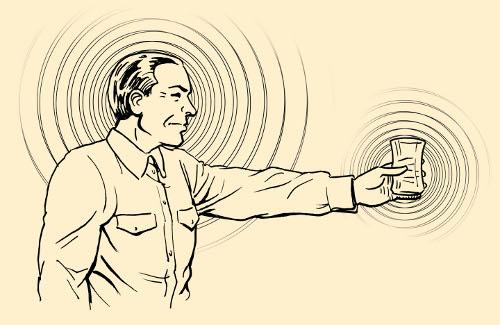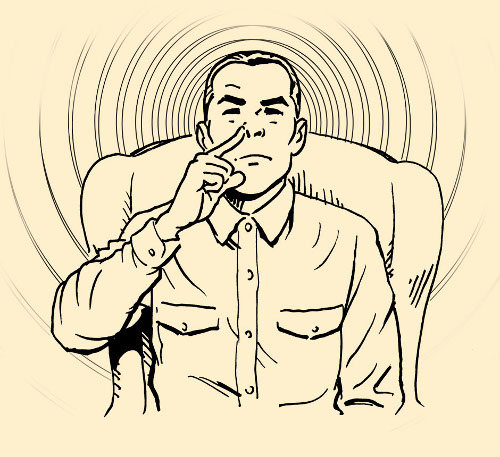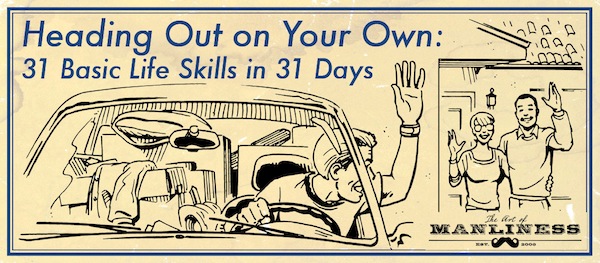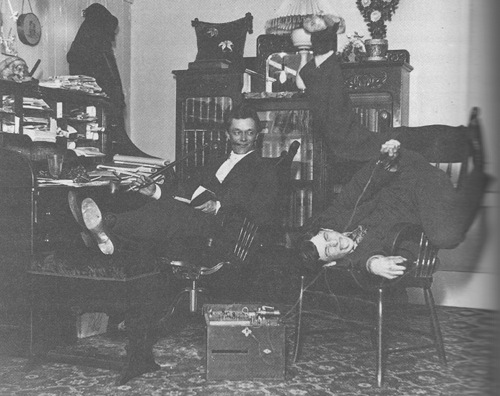
Does your mind flit from one thing to another? Do you have trouble focusing on something for more than a few minutes? Do you consequently have a bunch of half-finished projects lying around the house, and a dozen half-baked ideas still knocking around in your cranium, and thus a pile of regrets about where you’re at with those things and in your life? If so, what should you do?
Now if you went to the gym and tried to lift weights only to find your arms and legs were weak and flabby, you’d start a program of weekly exercises to strengthen your muscles. Well, your mind is a kind of muscle too! And just like the muscles in your body, your brain needs weekly exercise to tone up the strength of its focus and concentration. What’s a good workout for your noodle? Well, I discovered some interesting concentration exercises in a great old book from 1918: The Power of Concentration by Theron Q. Dumont, and have shared some excerpts from the book below, along with some great illustrations from Mr. Ted Slampyak. While some of the exercises are a little goofy and you may look like a crazy person staring at an outstretched glass of water, you’ll have the last laugh as your concentration power increases to Professor X levels. Use this guide to beef up your brain, or as inspiration to invent your own concentration exercises. Now put your finger on the side of your nose and let’s get started.
Concentration Exercises from 1918
The rays of the sun, when focused upon an object by means of a sun glass, produce a heat many times greater than the scattered rays of the same source of light and heat. This is true of attention. Scatter it and you get but ordinary results. But center it upon one thing and you secure much better results. When you focus your attention upon an object, your every action, voluntary and involuntary, is in the direction of attaining that object. If you will focus your energies upon a thing to the exclusion of everything else, you generate the force that can bring you what you want.
When you focus your thought, you increase its strength. The exercises that follow are tedious and monotonous, but useful. If you will persist in them you will find they are very valuable, as they increase your powers of concentration.
It will be necessary to first train the body to obey the commands of the mind. I want you to gain control of your muscular movements. The following exercise is especially good in assisting you to acquire perfect control of the muscles.
Exercise 1: Sitting Still in a Chair
Sit in a comfortable chair and see how still you can keep. This is not as easy as it seems. You will have to center your attention on sitting still. Watch and see that you are not making any involuntary muscular movements. By a little practice you will find you are able to sit still without a movement of the muscles for fifteen minutes. At first I advise sitting in a relaxed position for five minutes. After you are able to keep perfectly still, increase the time to ten minutes and then to fifteen. This is as long as it is necessary. But never strain yourself to keep still. You must be relaxed completely. You will find this habit of relaxing is very good.
Exercise 2: Fix Gaze on Fingers
Sit in a chair with your head up and your chin out, shoulders back. Raise your right arm until it is on the level with your shoulder, pointing to your right. Look around, with head only, and fix your gaze on your fingers, and keep the arm perfectly still for one minute. Do the same exercise with your left arm. When you are able to keep the arm perfectly steady, increase the time until you are able to do this five minutes with each arm. Turn the palm of the hand downward when it is outstretched, as this is the easiest position. If you will keep your eyes fixed on the tips of the fingers you will be able to tell if you are keeping your arm perfectly still.
Exercise 3: Fix Eyes on Outstretched Glass

Fill a small glass full of water, and grasp it by the fingers; put the arm directly in front of you. Now fix the eyes upon the glass and try to keep the arm so steady that no movement will be noticeable. Do this first for one moment and then increase it to five. Do the exercise with first one arm and then the other.
_____
The purpose of the above exercises is to gain control over the involuntary muscular movement, making your actions entirely voluntary. The following exercise [is designed] to bring your voluntary muscles under the control of the will, so that your mental forces may control your muscular movements.
_____
Exercise 4: Concentrate on Opening and Closing Fists
Move your chair up to a table, placing your hands upon it, clenching the fists, keeping the back of the hand on the table, the thumb doubled over the fingers. Now fix your gaze upon the fist for a while, then gradually extend the thumb, keeping your whole attention fixed upon the act, just as if it was a matter of great importance. Then gradually extend your first finger, then your second and so on until you open the rest. Then reverse the process, closing first the last one opened and then the rest, and finally you will have the fist again in the original position with the thumb closed over the finger. Do this exercise with the left hand. Keep up this exercise first with one hand and then the other until you have done it five times with each hand. In a few days you can increase it to ten times.
_____
The chances are that the above exercises will at first make you “tired,” but it is important for you to practice these monotonous exercises so you can train your attention. It also gives you control over your muscular movement. The attention, of course, must be kept closely on each movement of the hand; if it is not, you of course lose the value of the exercise.
You may think these exercises very simple and of no value, but I promise you in a short time you will notice that you have a much better control over your muscular movements, carriage and demeanor, and you will find that you have greatly improved your power of attention, and can center your thoughts on what you do, which of course will be very valuable.
No matter what you may be doing, imagine that it is your chief object in life. Imagine you are not interested in anything else in the world but what you are doing. Do not let your attention get away from the work you are at. Your attention will no doubt be rebellious, but control it and do not let it control you. When once you conquer the rebellious attention you have achieved a greater victory than you can realize at the time. Many times afterwards you will be thankful you have learned to concentrate your closest attention upon the object at hand.
Let no day go by without practicing concentrating on some familiar object that is uninteresting. Never choose an interesting object, as it requires less attention. The less interesting it is the better exercise will it be. After a little practice you will find you can center your attention on uninteresting subjects at will. The person that can concentrate can gain full control over his body and mind and be the master of his inclinations; not their slave. When you can control yourself you can control others. You can develop a Will that will make you a giant compared with the man that lacks Will Power. Try out your Will Power in different ways until you have it under such control that just as soon as you decide to do a thing you go ahead and do it. Never be satisfied with the “I did fairly well” spirit, but put forward your best efforts. Be satisfied with nothing else. When you have gained this you are the man you were intended to be.
_____
Exercise 5: Concentration Increases the Sense of Smell

When you take a walk, or drive in the country, or pass a flower garden, concentrate on the odor of flowers and plants. See how many different kinds you can detect. Then choose one particular kind and try to sense only this. You will find that this strongly intensifies the sense of smell. This differentiation requires, however, a peculiarly attentive attitude. When sense of smell is being developed, you should not only shut out from the mind every thought but that of odor, but you should also shut out cognizance of every odor save that upon which your mind, for the time, is concentrated. You can find plenty of opportunity for exercises for developing the sense of smell. When you are out in the air, be on the alert for the different odors. You will find the air laden with all kinds, but let your concentration upon the one selected be such that a scent of its fragrance in after years will vividly recall the circumstances of this exercise.
_____
The object of these exercises is to develop concentrated attention, and you will find that you can, through their practice, control your mind and direct your thoughts just the same as you can your arm.
_____
Exercise 6: Concentration on the Within
Lie down and thoroughly relax your muscles. Concentrate on the beating of your heart. Do not pay any attention to anything else. Think how this great organ is pumping the blood to every part of the body; try to actually picture the blood leaving the great reservoir and going in one stream right down to the toes. Picture another going down the arms to the tips of the fingers. After a little practice you can actually feel the blood passing through your system.
Exercise 7: Concentrating on Sleep
What is known as the water method is, although very simple, very effective in inducing sleep. Put a full glass of clear water on a table in your sleeping room. Sit in a chair beside the table and gaze into the glass of water and think how calm it is. Then picture yourself getting into just as calm a state. In a short time you will find the nerves becoming quiet and you will be able to go to sleep. Sometimes it is good to picture yourself becoming drowsy to induce sleep, and, again, the most persistent insomnia has been overcome by one thinking of himself as some inanimate object–for instance, a hollow log in the depths of the cool, quiet forest.
Those who are troubled with insomnia will find these sleep exercises that quiet the nerves very effective. Just keep the idea in your mind that there is no difficulty in going to sleep; banish all fear of insomnia. Practice these exercises and you will sleep.
Exercise 8: Practice Talking Before a Glass

Make two marks on your mirror on a level with your eyes, and think of them as two human eyes looking into yours. Your eyes will probably blink a little at first. Do not move your head, but stand erect. Concentrate all your thoughts on keeping your head perfectly still. Do not let another thought come into your mind. Then, still keeping the head, eyes and body still, think that you look like a reliable man or woman should; like a person that anyone would have confidence in…
While standing before the mirror practice deep breathing. See that there is plenty of fresh air in the room, and that you are literally feasting on it. You will find that, as it permeates every cell, your timidity will disappear. It has been replaced by a sense of peace and power.
The one that stands up like a man and has control over the muscles of his face and eyes always commands attention. In his conversation, he can better impress those with whom he comes in contact. He acquires a feeling of calmness and strength that causes opposition to melt away before it.
Three minutes a day is long enough for the practice of this exercise.
Exercise 9: The Eastern Way of Concentrating

Sit in a chair with a high back in an upright position. Press one finger against the right nostril. Now take a long, deep breath, drawing the breath in gently as you count to ten; then expel the breath through the right nostril as you count to ten. Repeat this exercise with the opposite nostril. This exercise should be done at least twenty times at each sitting.
Exercise 10: Controlling Desires
Desire, which is one of the hardest forces to control, will furnish you with excellent exercises in concentration. It seems natural to want to tell others what you know; but, by learning to control these desires, you can wonderfully strengthen your powers of concentration. Remember, you have all you can do to attend to your own business. Do not waste your time in thinking of others or in gossiping about them.
If, from your own observation, you learn something about another person that is detrimental, keep it to yourself. Your opinion may afterwards turn out to be wrong anyway, but whether right or wrong, you have strengthened your will by controlling your desire to communicate your views.
If you hear good news resist the desire to tell it to the first person you meet and you will be benefited thereby. It will require the concentration of all your powers of resistance to prohibit the desire to tell. After you feel that you have complete control over your desires you can then tell your news. But you must be able to suppress the desire to communicate the news until you are fully ready to tell it. Persons that do not possess this power of control over desires are apt to tell things that they should not, thereby often involving both themselves and others in needless trouble.
If you are in the habit of getting excited when you hear unpleasant news, just control yourself and receive it without any exclamation of surprise. Say to yourself, “Nothing is going to cause me to lose my self-control. You will find from experience that this self-control will be worth much to you in business. You will be looked upon as a cool-headed business man, and this in time becomes a valuable business asset. Of course, circumstances alter cases. At times it is necessary to become enthused. But be ever on the lookout for opportunities for the practice of self-control. “He that ruleth his spirit is greater than he that ruleth a city.”
Exercise 11: When You Read
No one can think without first concentrating his thoughts on the subject in hand. Every man and woman should train himself to think clearly. An excellent exercise is to read some short story and then write just an abridged statement. Read an article in a newspaper, and see in how few words you can express it. Reading an article to get only the essentials requires the closest concentration. If you are unable to write out what you read, you will know you are weak in concentration. Instead of writing it out you can express it orally if you wish. Go to your room and deliver it as if you were talking to some one. You will find exercises like this of the greatest value in developing concentration and learning to think.
After you have practiced a number of these simple exercises read a book for twenty minutes and then write down what you have read. The chances are that at first you will not remember very many details, but with a little practice you will be able to write a very good account of what you have read. The closer the concentration the more accurate the account will be.
It is a good idea when time is limited to read only a short sentence and then try to write it down word for word. When you are able to do this, read two or more sentences and treat similarly. The practice will produce very good results if you keep it up until the habit is fixed. If you will just utilize your spare time in practicing exercises like those suggested you can gain wonderful powers of concentration. You will find that in order to remember every word in a sentence you must keep out every thought but that which you wish to remember, and this power of inhibition alone will more than compensate for the trouble of the exercise. Of course, success in all of the above depends largely upon cultivating, through the closest concentration, the power to image or picture what you read; upon the power, as one writer expresses it, of letting the mountains of which we hear loom before us and the rivers of which we read roll at our feet.
Exercise 12: Watch Concentration

Sit in a chair and place a clock with a second hand on the table. Follow the second hand with your eyes as it goes around. Keep this up for five minutes, thinking of nothing else but the second hand, This is a very good exercise when you only have a few minutes to spare, if you are able to keep every other thought in the stream of consciousness subordinate to it. As there is little that is particularly interesting about the second hand, it is hard to do this, but in the extra effort of will power required to make it successful lies its value.
Always try to keep as still as possible during these exercises.
No related posts.



Heading Out on Your Own — Day 8: Living With Roommates

If you’re like most young men leaving the nest for the first time, you probably won’t have enough money to live all by yourself. To save money, you’ll very likely have to bunk with a roommate or two to cut down on living costs. While roommates can save you money (and provide camaraderie and companionship), they can pose many challenges. Any time you put two people with different backgrounds and lifestyles together under one roof, there’s bound to be conflict and awkward social moments.
Learning how to effectively manage the roommate relationship is an essential skill for every young man to have. Not only will it make living with roommates during your bachelor years easier, it also prepares you in many ways for when you settle down and start a family of your own.
Below we provide some tips on how to make living with roommates as drama-free as possible. The advice is based on my personal experience of living with dozens of roommates when I was single, many of whom came from completely different cultures than me.

Establish ground rules from the get-go. A friend of mine who left home a year earlier than me summed up this guideline thusly: “Establish rules before you need them.” Don’t wait until someone forgets to pay their share of the rent to figure out what happens when someone doesn’t pay the rent. Neither should you wait until the night before a big final to have the discussion about your roommate’s proclivity for blasting his TV at 2 AM in the morning.
The best thing you can do to get along with your roommate is to sit down with him the first day you move in (if you’re in the dorms) or before you sign a lease (if you’re getting an apartment) to discuss the rules of the apartment/dorm. Don’t make this conversation combative. Don’t be defensive and uptight. You want everyone to be as open and frank as possible. You can say something like, “Just so we’re on the same page and so we can avoid any conflicts in the future, can we lay down some ground rules for the apartment?”
What sort of rules should you establish? Here’s a list of a few questions you might consider bringing up in your conversation with your roommate:
- When should everyone pay their share of the rent and utility bills?
- Who cleans what and when? Also discuss the consequences if people don’t do their chores.
- What are the rules on dishes? Do dirty dishes get put in the dishwasher right away or can you leave them in the sink? Who unloads the dishes?
- Is smoking inside allowed?
- What are everyone’s drinking habits?
- What sort of expenses will we share? Cleaning supplies? Garbage bags? Toilet paper? Any shared food expenses like coffee and milk?
- What are the rules on bringing guests over? Can friends crash in the living room? How big of a heads-up should everyone give before having a party or bringing guests over? Do we even need to give a heads-up?
- What about significant others? Can they spend the night? Can they hang out all day, every day? Can we give them duplicates of our keys? You’ve got to be careful with this one. I’ve seen several roommate relationships go south because a girlfriend slowly turned into a non-paying third tenant. Nip that in the bud from the get-go.
- Speaking of significant others, if you’re sharing a room with a roommate, you might want to establish some sort of “Do Not Disturb” signal. It will save you from some awkward walk-ins.
- What are the rules on morning and nighttime noise levels?
- Are pets allowed?
- What temperature are we going to keep the thermostat set at? (You’d be surprised how contentious this issue can be with roommates.)
- Have everyone share whether they’re neat freaks or slobs. It’s best to know from the outset so you can manage expectations about what constitutes a clean apartment.
A lot of roommate conflict boils down to a mismatch of expectations. Roommates expect each other to be mind-readers, and to live up to expectations that they’ve never actually verbalized, but simply expect the other guy to magically know and adhere to. When the expectations aren’t met, resentment follows. By sitting down together before you move in, you’ll know what to expect. For whatever psychological reason, even when someone doesn’t meet your standards, if you already know that they won’t, you won’t get bent out of shape about it.
By the way, I know some will feel resistant to the idea of drawing up ground rules, feeling like you’re young and want to keep things loose and that because you’re buddies, things will just naturally work out. Maybe they will, maybe they won’t. Think of the ground rules as friendship insurance — getting a policy isn’t the most pleasant task, and maybe you won’t need it, but if you do, it can keep your friendships intact and make the whole experience smoother and more enjoyable.
Be flexible and willing to compromise (but stand firm on your deal-breakers). During your conversation about ground rules, you and your roommates will inevitably run into disagreements. Be flexible and work to compromise in order to accommodate each other’s differing lifestyles. For example, if you’re a night owl and your roommate is not, you should be willing to keep the noise down after he goes to bed, and he should in turn try to get ready quietly in the morning when you’re still snoozing. If there are some things that are deal-breakers for you, don’t be afraid to stand your ground. So if you don’t want any smoking in the house, say so. If your roommate isn’t willing to adjust to your request, find a new place or roommate.
Follow the Golden Rule. The key to managing roommate relationships is be mutually respectful and considerate of one another. You will be well served by following the Golden Rule. If you don’t like walking into your living room to unexpectedly find a stranger sacked out on the couch, don’t invite friends over without giving your roommate a heads-up; don’t touch your roommate’s stuff without asking permission first; don’t leave your dirty dishes in the common area. You get the idea.
Have a weekly sync-up meeting. One activity that I found immensely useful in managing and preventing roommate conflicts is having a weekly meeting to sync up with each other. At this meeting you can discuss bills that need to be paid and chores that need to be done. It’s also a good time to let your roommate know about guests that are coming over in the coming week, so they have a heads-up.
The sync-up meeting is a good time to bring up and resolve any issues that are causing friction between roommates. Again, don’t be combative when you bring up concerns. Just tell your roommate what’s been bothering you and ask what the two of you can do to resolve the issue.
I’d also use this time to ask my roommate if there’s anything I can do to help him out that week. For example, if I knew that he was working overtime to finish a school paper, I’d ask if there were any chores or errands I could help out with that week. My roommates would do the same for me when I was getting bogged down.
Another nice feature about the weekly sync-up meeting is that it carries over nicely to married life. Kate and I do something similar in our own relationship. It’s a practice that has definitely contributed to our success in both our marriage and our business.

There will be conflict. Address it calmly and directly instead of avoiding it. Conflict and disagreements are a normal part of any relationship, be it in a marriage or with a roommate. So don’t be surprised if you and your roommate don’t get along all the time. Unfortunately, many young people handle conflict by simply acting like it doesn’t exist or hoping that the conflict will magically resolve itself. Managing conflict like this will only turn small issues into big ones. Don’t avoid conflict. Don’t leave each other passive aggressive notes. Instead, rip off that band-aid and understand that “pain now is better than pain deferred.” So if you notice that your roommate is slacking off on his chores or is stealing borrowing your food, bring it up as soon as you can. Don’t let the conflict fester until it blows up like a puss-filled boil.
Understand you don’t have to be best friends with your roommate. One mistake I’ve seen many young people make when entering roommate relationships for the first time is having unreasonably high-expectations about the relationship. They expect that they’ll be best buddies with their roommates and do everything together and never get in fights. Their roommate, on the other hand, prefers to have his space and spend time with his own friends. This mismatch in expectations can cause friction in the relationship from the get-go.
To prevent this mismatch of expectations, go in understanding that you and your roommate might not be best buds, but merely roommates who respect each other. While you should certainly invite your roommate out to a party or a ballgame, don’t get offended if he declines. That’s his prerogative.
Even if you’re rooming with your best friend from high school, understand that just because you’re good friends doesn’t mean you’ll naturally be good roommates. I’ve seen the most volatile roommate fights between people who were once best friends. The problem usually stems from poor expectation management. Best buds naively assume that they’ll get along without establishing ground rules or having weekly sync-up meetings. But they don’t. Don’t skip those steps if you’re moving in with a good friend.
Friendships can also deteriorate if you rely on each other for all your social and emotional needs. Even if you’re two manly peas in a pod, don’t spend all your time with each other. Make other friends, find different interests, and do things separately sometimes.
Use Google Docs and Google Calendars to manage everything. During my roommate days, the only tool we had to manage shared expenses and chores was a whiteboard. My roommates and I would post rent due dates and the chores list for the week. And of course, the whiteboard was used occasionally for scribbling passive aggressive notes about some grievance.
Take a tip from Apartment Therapy and upgrade from the humble whiteboard to the Cloud by using shared Google documents and calendars to manage your roommate experience:
- Create a Google spreadsheet to manage rent and other shared expenses.
- Another spreadsheet can be used to keep track of chores and whether they’ve been done.
- Create and share a Google Calendar just for your roommates so you keep everyone abreast of when guests are coming over or dates for parties. You can also put rent and utility due dates on the calendar and have Google send everyone an email reminder when the date rolls around.
- Use a shared Google write document to share random notes.
If your roomies don’t use Google, you’ll have to convince them to sign up to take advantage of this system.
GoodMate is a new web app that allows you to manage the roommate experience from a central dashboard. You can manage shared expenses, chores, and calendars all within GoodMate. GoodMate will email your roommates with reminders to pay rent or do their chores. The only downside to GoodMate is that you have to sign-in with Facebook. If you have a roommate who doesn’t use Facebook, you’ll have to use the whiteboard. And look into whether he hasn’t time-traveled to your apartment from the year 2002.
I Can’t Stand My Roommate. What Can I Do?
Despite doing your darnedest to make it work, your relationship with your roommate has reached a point that you can’t imagine living another day with him. What can you do?
If you’re living in a dorm, go talk to your RA. They might be able to help you make a room switch. I had a friend in college who decided to get assigned a random dorm roommate for the “experience.” Little did she know that the roommate assigned to her would turn out to be certifiably crazy. After a few weeks of trying to make the relationship work, my friend asked for a new dorm room. She got one with little trouble.
If you’re living in an apartment, getting rid of a bad roommate or moving out is a bit trickier because of the lease agreement. Unless you have enough money to pay for the months remaining in your lease agreement, plus an early termination fee, moving out might not be an option. You could always evict your roommate, but that process can take time and makes an already awkward situation even awkwarder. The eviction process is a bit complex for this post, so I might revisit it later in a future post if there’s any interest.
Unless your apartment roommate is not paying their share of the rent or is conducting illegal activities in your apartment, your best bet is to wait until the lease is up and go your separate ways. It will be a learning experience for sure.
Any other tips for the young man living with roommates for the first time? Share them with us in the comments!
Related posts:
- “Are You a Good Roommate?” Quiz from 1947 Men’s Magazine
- How to Find Your First Apartment
- Check out The Manival #6 At Building Camelot
- Heading Out on Your Own — Day 1: Develop a Self-Reliant Mentality
- Heading Out on Your Own – Day 5: Create a Weekly Attack Plan





















0 comments:
Post a Comment